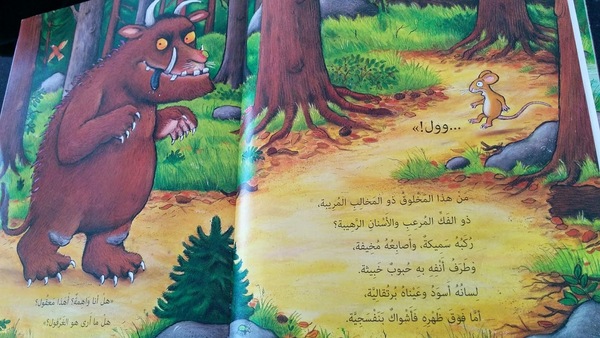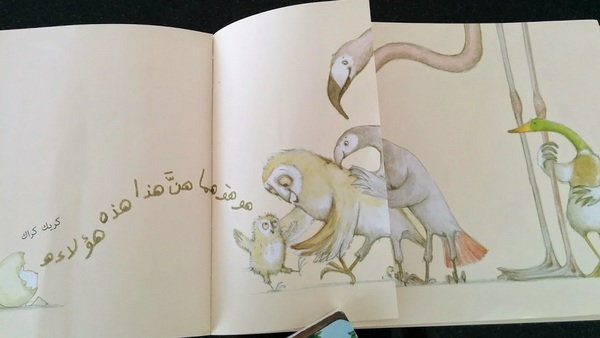I realise it’s a bit odd trying to introduce Arabic to my kids when it’s not my language. I know that out of the three key factors - need, exposure and prestige – none are really present enough for Arabic in our family. There’s really no need to speak of, since all the Arabic speakers in the family have a second native tongue, French or English. As for exposure, the kids only get a tiny bit of exposure from my in-laws, but at least it’s authentic. However, I’m not aiming to teach them the language as such. I couldn’t if I wanted to. I just want to open their minds to it, to give them the option of tuning in to it, rather than tuning out when they hear it spoken. By viewing it as important, I can at least give it a modicum of prestige. I also thought the native Arabic speakers we know would enjoy reading to the kids, although that side of it didn’t quite work out as planned.
So back to translated books. As for Al Gharfoul, as The Gruffalo is called in Arabic, I’m not qualified to judge the quality of the translation and I haven’t had much feedback from Arabic speakers. But we like reading it, and I’ve chosen a few simple expressions from it to use around the house with my three-year old, for example “ila ayna, ila ayna” (in the original, “where are you going”), “fa’ra” (mouse) and “lisayn aswad” (“black tongue”). This has been a lot of fun and my three-year old daughter does play around with these words on her own, along with a few others she has learnt.
I did notice a few short vowels are not printed. Probably it’s because these are words that would rarely be mispronounced, so there’s no need to add vowels for clarification even for children. Typically, if you can read a story this long in Arabic then you know the language well enough to pronounce these words correctly. But…I don’t, really, and this story is over my head linguistically. I have to decipher it fairly slowly. If my three-year old, who understands even less, wasn’t such a bookworm and a language nerd then she’d get bored. I rarely read the entire text in one sitting, and nor does anyone else. Sometimes I do the narration in English and the voices in Arabic.
So having learnt from this, I recently ordered the Arabic translation of The Odd Egg by Emily Gravett. Ironically, I used to borrow the English original from our little library in Beirut. Back then, my daughter wasn’t two yet. There is much less text than The Gruffalo. The text is also bigger and all on a cream background, making the script easier for me to read. As for the translation, in the original, there are some words in the illustrations, for example, comments by the birds, and the title of a book which is pictured. All of this has been carefully rendered in Arabic in the same handwritten style. Much better than the Spanish translations of Charlie and Lola, aka Juan y Tolola, which are in the local library; Charlie has been renamed Juan, but in the picture his top still has Charlie written on it. I particularly like the rendering of the owl’s brainy utterance which was a list of sums in the original: in the translation, it becomes a string of literary Arabic pronouns.
Conclusion: Both are lovely but I should stick to short stories for now!
It might be just what’s needed to trigger some passive learning. I do want my kids to feel attached to it as a family language. I feel attached to it, and I’m only Lebanese on paper, not by blood like them. If they were to take it further later, then there are native speakers in the family, it’s just that for now we need them to help us with French!


Thank you for sharing these stories! I love reading about multilingual families!
And I miss Arabic so much. I’m currently living in Budapest but have no desire to learn Hungarian like I did Arabic. I miss the sounds and look of Arabic.
Oh I’m glad someone gets it at least! My in-laws probably think I’m nuts!
Finding good Arabic books is a nightmare. So far ALL that I found are translations. Some good some not as much. What is frustrating to me is the fact that the books give the language but not the culture. The next best thing I found was “Kalila wa Dimna”, but I am not sure I am very comfortable with some of the narratives… nor some of the morals either! Is that the Arabic culture? You’re not the only ones in that boat!